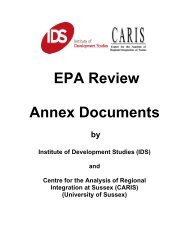The Impact of Energy Use on Poor Urban Livelihoods in ... - DfID
The Impact of Energy Use on Poor Urban Livelihoods in ... - DfID
The Impact of Energy Use on Poor Urban Livelihoods in ... - DfID
You also want an ePaper? Increase the reach of your titles
YUMPU automatically turns print PDFs into web optimized ePapers that Google loves.
<str<strong>on</strong>g>The</str<strong>on</strong>g> impact <str<strong>on</strong>g>of</str<strong>on</strong>g> energy use <strong>on</strong> poor urban livelihoods <strong>in</strong> Arusha, Tanzania,<br />
from a deteriorati<strong>on</strong> <strong>in</strong> the ec<strong>on</strong>omy <strong>in</strong> the 1990s. A situati<strong>on</strong> that c<strong>on</strong>t<strong>in</strong>ues <strong>in</strong> 2004.<br />
Women's fuel preferences related not <strong>on</strong>ly to cost but also to a variety <str<strong>on</strong>g>of</str<strong>on</strong>g> other<br />
factors such as:<br />
� wear and tear <strong>on</strong> pots and pans;<br />
� whether a servant was <strong>in</strong>volved with the cook<strong>in</strong>g;<br />
� traditi<strong>on</strong>al ideas about the taste <str<strong>on</strong>g>of</str<strong>on</strong>g> food and the type and amount <str<strong>on</strong>g>of</str<strong>on</strong>g> food to be<br />
cooked; and<br />
� experience, knowledge and familiarity with a specific fuel.<br />
2.2.4 <str<strong>on</strong>g>Energy</str<strong>on</strong>g> as an urban poverty transform<strong>in</strong>g vector<br />
This study accepts that energy has a significant role <strong>in</strong> improv<strong>in</strong>g the lives <str<strong>on</strong>g>of</str<strong>on</strong>g> the<br />
urban poor and sets out to clarify the nature <str<strong>on</strong>g>of</str<strong>on</strong>g> the transform<strong>in</strong>g process. In particular<br />
it aims to test the assumpti<strong>on</strong>s underly<strong>in</strong>g MDGs 2 and 3, specifically that:<br />
� improved energy efficiency will lead to women and girls hav<strong>in</strong>g more time for<br />
more activities;<br />
� some <str<strong>on</strong>g>of</str<strong>on</strong>g> the time saved will be used to achieve some (or more) educati<strong>on</strong>; and<br />
� that improved educati<strong>on</strong> will c<strong>on</strong>tribute to women and girls improv<strong>in</strong>g the<br />
livelihoods <str<strong>on</strong>g>of</str<strong>on</strong>g> their families and thus reduc<strong>in</strong>g their poverty.<br />
In order to do this it addresses two hypotheses.<br />
� Time saved by us<strong>in</strong>g modern energy will result <strong>in</strong> women and girls hav<strong>in</strong>g greater<br />
participati<strong>on</strong> <strong>in</strong> educati<strong>on</strong>al activities, and<br />
� access to modern energy will c<strong>on</strong>tribute to gender equality and women’s<br />
empowerment.<br />
To test the hypotheses the study set out to answer eight questi<strong>on</strong>s. <str<strong>on</strong>g>The</str<strong>on</strong>g>se are as<br />
follows:<br />
<str<strong>on</strong>g>The</str<strong>on</strong>g> current situati<strong>on</strong><br />
� What is the level <str<strong>on</strong>g>of</str<strong>on</strong>g> access to and use <str<strong>on</strong>g>of</str<strong>on</strong>g> modern and traditi<strong>on</strong>al energy <strong>in</strong> urban<br />
households?<br />
� What physical energy assets do people have?<br />
� What are the roles, resp<strong>on</strong>sibilities and rights (decisi<strong>on</strong>-mak<strong>in</strong>g) with<strong>in</strong> the<br />
household?<br />
� How much time is used <strong>in</strong> energy related reproductive activities?<br />
� What strategies are used to save time when us<strong>in</strong>g energy?<br />
� What is the nature <str<strong>on</strong>g>of</str<strong>on</strong>g> energy poverty <strong>in</strong> the case study wards?<br />
Opportunities for change and their implicati<strong>on</strong>s<br />
� What changes <strong>in</strong> energy role, resp<strong>on</strong>sibilities and rights are needed to reduce<br />
time spent <strong>on</strong> energy related activities?<br />
� How will women and girls use the saved time?<br />
8<br />
Development Plann<strong>in</strong>g Unit, UCL L<strong>on</strong>d<strong>on</strong><br />
Dr. Sheilah Meikle and Patrice North
















